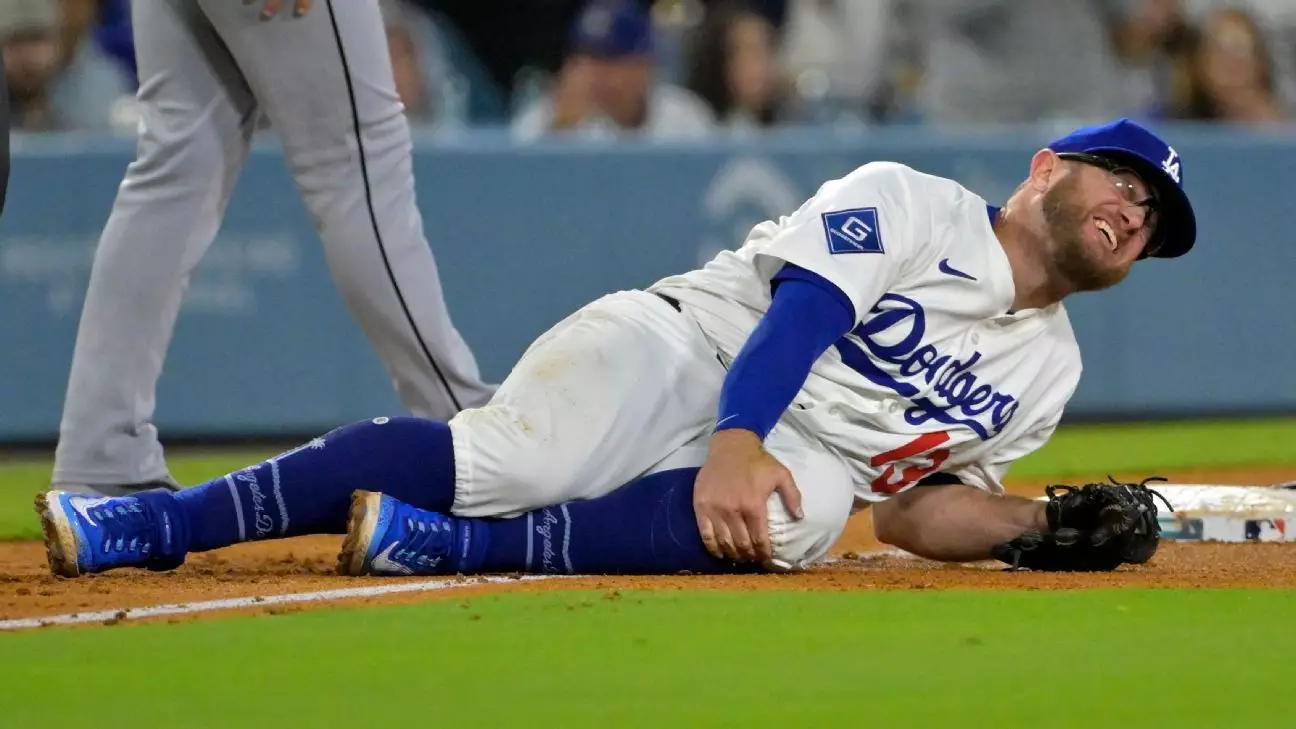In the high-stakes world of professional sports, injuries are an inevitable, often unwelcome part of the game. When Los Angeles Dodgers’ hotshot third baseman Max Muncy suffered a collision that sidelined him, it wasn’t just about the physical pain—it was an emotional rollercoaster. The initial fear of serious damage can weigh heavily on athletes who have dedicated their lives to excellence on the field. Muncy’s relief upon hearing the MRI results—that there was no torn ligament or fractured bone—serves as a reminder that even in the face of adversity, hope can prevail. Yet, his acknowledgment that a six-week absence still feels like a lengthy ban underscores the mental resilience required to navigate injury setbacks in a sport that demands peak performance every game.
This emotional complexity distinguishes sports injuries from ordinary setbacks. An athlete’s identity often intertwines with their physical health, making injuries feel like personal failures or lost opportunities. Muncy’s candid reflections reveal a level of vulnerability—as he grapples with the reality of lost playing time, the uncertainty of returning to form, and the mental challenge of crossing a long recovery period. The emotional toll can be underestimated, but it’s pivotal for athletes and fans alike to recognize that resilience isn’t just about weathering pain; it’s about maintaining hope amid the inevitable disappointments that accompany high-performance sports.
Collisions on the Field: The Catalyst of Unpredictability
In baseball, the game’s inherent unpredictability often manifests in moments that are electrifying yet perilous. Muncy’s injury resulted from a seemingly routine play—a collision in the midst of a stolen base attempt that morphed into an unwelcome nightmare. This incident highlights how fragile safety can be, even in a game as precise and strategic as baseball. Players constantly balance aggressive plays with the risk of injury, and while they train tirelessly for moments of glory, they also accept the lurking possibility of setbacks.
The collision involving Michael A. Taylor and Muncy was a poignant reminder of baseball’s unpredictable nature. As Taylor suffered a bruised back and was sidelined, it demonstrated how a single play can have ripple effects across multiple players and teams. The tension escalates when injuries occur in high-stakes moments—here, right before Clayton Kershaw’s milestone achievement. The coincidence added an emotional layer: a moment of personal triumph intertwined with unforeseen adversity.
This incident underscores a broader truth about sports: resilience isn’t just about individual endurance. It’s about how teams and players adapt swiftly to unexpected crises, reconfiguring strategies while managing physical and emotional recovery. The prompt reactions—calling up new players like Esteury Ruiz and adjusting the roster—highlight the importance of adaptability. In a game built on unpredictability, mental toughness and team cohesion become paramount.
From Setback to Opportunity: The Power of Team Dynamics and Future Outlook
While injuries cast long shadows, they also open doors for emerging talent and renewed strategic focus. Muncy’s absence created an immediate need for roster adjustments, leading the Dodgers to recall outfielder Esteury Ruiz, a player possessing fresh vigor and potential. Such moves—though prompted by injury—can rejuvenate a team’s dynamics, fostering competition and providing opportunities for fringe players to showcase their abilities.
The Dodgers’ response exemplifies a broader lesson: adversity often acts as a catalyst for growth. When an established star like Muncy is sidelined, it forces managers and players to elevate their collective effort. Enrique Hernandez stepping into third base, and Tommy Edman preparing to join the roster, highlight how teams must continually evolve. These are strategic responses rooted in resilience—acknowledging that setbacks, while challenging, are also opportunities for others to step up.
Moreover, Muncy’s individual story—his worry about losing time, his relief at the absence of severe injury—resonates with fans who understand that recovery isn’t just physical but profoundly mental. His openness about his feelings humanizes him and inspires others dealing with setbacks. It reinforces the idea that perseverance and a positive attitude are essential ingredients for long-term success, not just in baseball but in any pursuit requiring dedication and resilience.
Ultimately, the Dodgers’ handling of the injury crisis demonstrates a proactive approach rooted in optimism. The team’s ability to quickly pivot, bolster the roster, and maintain focus points to a broader truth in sports: setbacks are inevitable, but they don’t define an athlete’s or team’s journey. With each challenge comes an opportunity to prove resilience, adapt under pressure, and emerge stronger than before. This resilience—anchored in hope, adaptability, and unwavering commitment—is what elevates sports from mere competition to a testament to human tenacity.

